Donald Trump’s inauguration may be 58 days away, but for the Muslim officials once welcomed into the U.S. government’s war on terrorism, the change already has begun.
Four U.S. officials who spoke to The Daily Beast said fear is pervasive among Muslims inside the halls of the Pentagon, the CIA, and the Department of Homeland Security in anticipation of a Trump administration. Already, the officials said, they are seeing colleagues who are less willing to share their thoughts about national security. They fear they will no longer be seen as an asset to confronting terrorism but rather suspect members of the government they serve.
It is, one U.S. official explained, a climate of “anticipatory freakout.”
Muslim employees at the Pentagon, both civilian and military, were reticent to talk about their fears, even in a building where there are Muslim services every Friday.
“I am scared to speak,” one civilian told The Daily Beast. “We don’t know what it is going to mean for us.”
Will Muslim CIA agents be asked to register? Will the next commander in chief ban the family of Muslim troops from visiting this country? Will Muslim members of the Department of Homeland Security face increased scrutiny based on their faith?
“It’s one thing to attack your argument. It’s another to attack your person. And that is what people fear: that if they speak up too much, they will be attacked,” the U.S. official continued.
“You are less likely to speak up if you are against the prevailing view. Before, that was not a consideration.”
Managers throughout the departments already are trying to calm staffers, reassuring them they will not be treated differently by those around them.
It is not just Muslims who are worried. Gays and lesbians, African Americans, Hispanics, and women all have expressed some level of concern. After all, the national-security community has historically lagged behind other government agencies when it comes to embracing diversity.
It was not until a 1995 executive order that gays and lesbians could serve openly in national-security jobs and get clearances. At the same time, women climbed the ranks of the agencies, most notably in 1997, when Madeleine Albright became the first female secretary of State, the highest national-security position ever held by a woman. Post-9/11, two presidents publicly spoke on behalf of Muslims and said they are a part of the American fabric, not a segment of the population that should be equated with extremists.
According to the White House, minorities now make up 20 percent of senior diplomats and 15 percent of senior military officers and intelligence officials.
Despite that, the fear these days among Muslims especially is born out of both the rhetoric of the election and, more recently, Trump’s picks so far for his national-security team. Ret. Army Lt. Gen. Michael Flynn, the incoming national security adviser, has called fear of Muslims “rational.” On Sunday, Reince Priebus said on Meet the Press that while there was no plan for a Muslim registry, “I’m not going to rule out anything.”
Also Sunday, Kansas Secretary of State Kris Kobach met with Trump and was photographed carrying a document spelling out a 100-day plan for the Department of Homeland Security that included a proposal to question “high-risk” immigrants over support for Sharia law and belief in the U.S. Constitution.
Perhaps the most searing interaction between Muslims and Trump, for Muslims who serve in national security, was Trump’s treatment of a Muslim Gold Star family during the presidential campaign. After Khizr Khan—whose son, Capt. Humayun Khan, was killed in Iraq in 2004—spoke at the Democratic National Convention, Trump attacked him and his wife, and insisted that he too had “made a lot of sacrifices.”
The result is a president-elect not welcome in the nation’s mosques.
For some, there already is a litmus test for incoming members of the Trump administration: Will agency heads and Cabinet secretaries let the mistreatment of Muslims or any other minority be tolerated? Some said they hope Congress poses such questions to Flynn during the confirmation hearings.
Either way, the new administration is a marked change. For the Obama administration, diversity within the administration was not just about politics but a means to better secure the country. And officials advocated it aggressively. Departments now are filled with younger staffers, many of whom never anticipated anything other than a government that embraced diversity.
Where minority staffers once were in lower-level jobs, now it is no longer uncommon to see a Muslim in hijab at the table of a high-level meeting.
“I truly believe that the business case for diversity is stronger for CIA than it is for any organization in the U.S. government,” CIA Director John Brennan told the Senate Select Committee on Intelligence in June. “Diversity not only gives us the cultural understanding we need to operate in any corner of the globe, it also helps us avoid groupthink, ensuring we bring to bear a range of perspectives on the complex challenges that are inherent to intelligence work.”
Just last month, President Obama issued a memorandum about “Promoting Diversity and Inclusion in the National-Security Workforce” that called for better data about the makeup of national-security employees and to help expand diversity within the national-security community.
There is nothing that binds the incoming president from adhering to any part of the memorandum.





